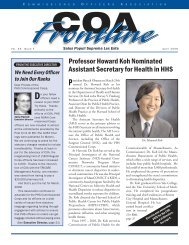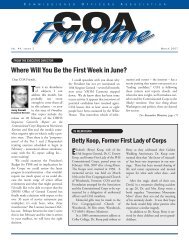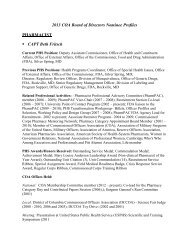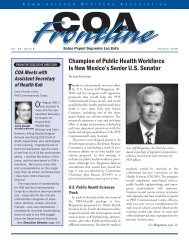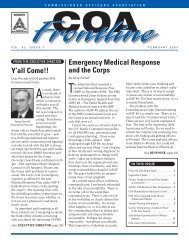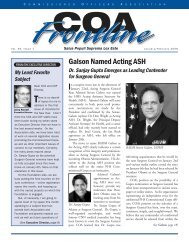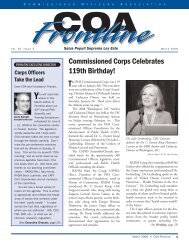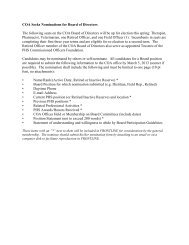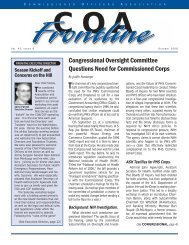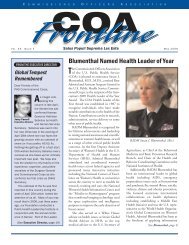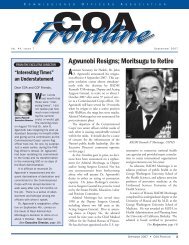rutstein retirement sends shock waves throughout the commissioned
rutstein retirement sends shock waves throughout the commissioned
rutstein retirement sends shock waves throughout the commissioned
Create successful ePaper yourself
Turn your PDF publications into a flip-book with our unique Google optimized e-Paper software.
COA BRANCH<br />
PHS Officers Volunteer at Washington, DC Area Food Bank<br />
DC-COA Volunteers at <strong>the</strong> National<br />
Capital Area Food Bank<br />
On a hot and humid Saturday in July,<br />
42 Commissioned Officers and<br />
10 family members traveled to a warehouse<br />
in Washington, DC to volunteer<br />
at <strong>the</strong> National Capital Area Food Bank<br />
(CAFB). They sorted and packed nonperishable<br />
food items for distribution to<br />
those in need. This is not <strong>the</strong> first time<br />
Public Health Service (PHS) officers<br />
have so generously given of <strong>the</strong>ir time<br />
in support of <strong>the</strong> mission of <strong>the</strong> CAFB.<br />
Since 2007, more than 60 PHS officers<br />
have volunteered to sort non-perishable<br />
food items to help CAFB fulfill its<br />
mission. This event was coordinated<br />
under <strong>the</strong> auspices of <strong>the</strong> District of<br />
Columbia Metropolitan Area Branch of<br />
<strong>the</strong> Commissioned Officers Association<br />
(DC-COA). LCDR Samantha Fontenelle<br />
has organized and coordinated <strong>the</strong> CAFB<br />
volunteer activity for <strong>the</strong> past several<br />
years. PHS Officers’ efforts have complimented<br />
those of o<strong>the</strong>r volunteers to<br />
help save <strong>the</strong> CAFB thousands of dollars<br />
each year, while having a significant impact<br />
on hunger in <strong>the</strong> DC metro area.<br />
Hunger and its Impact on Health<br />
Hunger is a significant problem for many<br />
people in <strong>the</strong> DC area. From 2006-2008,<br />
<strong>the</strong> U.S. Census estimated more than<br />
640,000 DC area residents were at risk<br />
of being hungry, 200,000 of <strong>the</strong>m being<br />
children. The recent study “Hunger in<br />
America 2010” reported that more than<br />
478,100 people, including 224,707 children,<br />
receive emergency food each year through<br />
<strong>the</strong> CAFB and its network of 700 partner<br />
agencies. An estimated 88,400 people receive<br />
emergency food assistance each week<br />
from a food pantry, soup kitchen, or o<strong>the</strong>r<br />
agency served by <strong>the</strong> CAFB – 19,000 more<br />
than four years ago (CAFB, 2010). i<br />
People affected by hunger are not just<br />
<strong>the</strong> poor; <strong>the</strong>y include working families,<br />
children, and <strong>the</strong> elderly. They must frequently<br />
choose between buying groceries<br />
and paying for <strong>the</strong>ir living expenses.<br />
More than 50 % of people receiving food<br />
assistance have jobs, a sobering statistic.<br />
Hunger adversely impacts public health<br />
and our communities: children who<br />
suffer from hunger have a diminished<br />
capacity to learn; adults can’t work as<br />
effectively; and seniors are more prone to<br />
illness. Ultimately, those affected daily by<br />
hunger are unable to live to <strong>the</strong>ir fullest<br />
potential and contribute <strong>the</strong>ir ideas, energy,<br />
and talents to <strong>the</strong>ir communities.<br />
Capital Area Food Bank’s Mission<br />
The CAFB will celebrate its 30th anniversary<br />
this year, a major milestone<br />
for a program that was intended as a<br />
temporary measure. The CAFB began<br />
on Martin Lu<strong>the</strong>r King, Jr.’s birthday in<br />
1980 as a response to a weak economy<br />
and cuts in <strong>the</strong> Food Stamp Program.<br />
Since opening its doors, <strong>the</strong> community’s<br />
need for <strong>the</strong> CAFB has grown tremendously<br />
as more and more residents have<br />
been impacted by hunger. Today, <strong>the</strong><br />
CAFB is <strong>the</strong> largest, public nonprofit food<br />
and nutrition resource in <strong>the</strong> DC area.<br />
Each year, <strong>the</strong> organization distributes<br />
over 28 million pounds of food, including<br />
produce. Through a network of 700<br />
partner agencies, including soup kitchens,<br />
homeless shelters, low-income housing<br />
communities, day care centers, elder care<br />
facilities, youth programs and faith-based<br />
organizations. Nearly 100,000 people<br />
benefit from <strong>the</strong>se efforts each week.<br />
The mission of <strong>the</strong> CAFB is not only to<br />
distribute food, but to educate, empower,<br />
and enlighten <strong>the</strong> community on issues<br />
of hunger and nutrition. The CAFB also<br />
accomplishes its mission to help fight<br />
hunger in <strong>the</strong> DC metro area, through<br />
volunteer support and donations. More<br />
than 12,000 volunteers annually support<br />
<strong>the</strong> organization’s efforts, saving it over<br />
$729,000 in staffing costs. The CAFB<br />
<strong>the</strong>n channels <strong>the</strong> savings back into <strong>the</strong><br />
program to feed <strong>the</strong> community.<br />
Fighting Hunger a Positive<br />
Experience for Corps Officers<br />
The experience had a profound impact<br />
on <strong>the</strong> PHS volunteers. “I was surprised<br />
to learn how many children face hunger,”<br />
reported LCDR Melaine Shin, from <strong>the</strong><br />
FDA’s Office of Generic Drugs. “But<br />
it was great to see <strong>the</strong>se volunteering<br />
activities coordinated by PHS, which<br />
provides officers an opportunity to participate<br />
in community outreach efforts. It<br />
was a very rewarding experience for me<br />
personally and I look forward to volunteering<br />
again in <strong>the</strong> near future.”<br />
O<strong>the</strong>r volunteers noted <strong>the</strong> camaraderie<br />
among PHS officers working toge<strong>the</strong>r<br />
for a common cause. “It was a great way<br />
to volunteer my time for a good cause<br />
and a wonderful way to meet o<strong>the</strong>r<br />
officers in <strong>the</strong> DC area,” said LTJG<br />
Samantha Spindel, from <strong>the</strong> FDA’s<br />
Center for Devices and Radiological<br />
Health. “I am looking forward to my<br />
first deployment so I can experience <strong>the</strong><br />
PHS spirit, dedication, and hard work in<br />
action during a national emergency.”<br />
The spirit of PHS was on display by <strong>the</strong><br />
officers who volunteered at <strong>the</strong> Capital<br />
Area Food Bank. They took ano<strong>the</strong>r step<br />
in advancing <strong>the</strong> mission of <strong>the</strong> U.S.<br />
Public Health Service Commissioned<br />
Corps to protect, promote, and advance<br />
<strong>the</strong> health and safety of our nation.<br />
The time spent at <strong>the</strong> CAFB not only<br />
provided a sense of personal enrichment<br />
that often comes with helping o<strong>the</strong>rs,<br />
it also engendered a broader awareness<br />
of <strong>the</strong> sometimes seemingly invisible<br />
hunger problem in this country and its<br />
inter-relationship with public health.<br />
The DC-COA Officers expressed <strong>the</strong>ir<br />
thanks and gratitude to <strong>the</strong> staff of <strong>the</strong><br />
CAFB with a coin ceremony, recognizing<br />
all that <strong>the</strong>y do to help to fight hunger<br />
in <strong>the</strong> DC metro area. The Officers<br />
also expressed <strong>the</strong>ir continued commitment<br />
to volunteering at <strong>the</strong> CAFB and<br />
recognized LCDR Samantha Fontenelle,<br />
who has organized and coordinated this<br />
activity for <strong>the</strong> past several years. The<br />
CAFB staff and <strong>the</strong> PHS organizers<br />
thanked all <strong>the</strong> PHS Officers who volunteered<br />
and made <strong>the</strong> event a success.<br />
i<br />
Capital Area Foodbank (CAFB). 2010. Press Release<br />
– Landmark New Study Reveals 25 percent increase<br />
in Washington metro area residents seeking emergency<br />
food assistance.<br />
By LCDR Beverly Weitzman &<br />
LCDR Samantha Fontenelle<br />
Reviewers: LCDR Sara Anderson &<br />
LCDR Christine Merenda<br />
october 2010 | Frontline<br />
3



